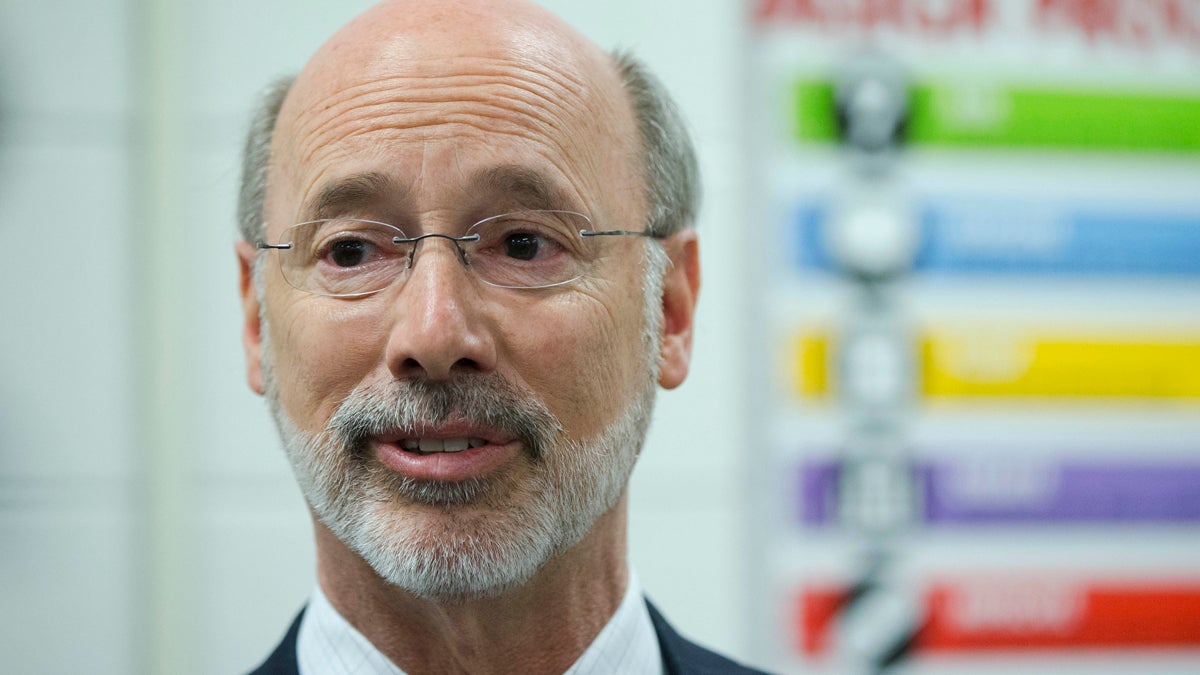Wolf breaks silence on his ideas for fixing underfunded municipal pensions
Listen
Pennsylvania Governor Tom Wolf (AP Photo/Matt Rourke)
Some experts say turning to pension bonds, which Wolf is suggesting for some cities, is risky, in general, and ill-timed.
Governor Tom Wolf announced a four-person task force focused on municipal pensions — and suggested some tactics they might consider when deciding what to recommend.
Wolf had yet to say during his five months in office what, specifically, he thinks municipalities should do to deal with retirement systems underfunded by an estimated $7.7 billion.
When officials talk about “underfunded pension liability”, they mean the difference between what they expect to have on hand and what they’ll actually need to pay pensions to retired and vested police, paid firefighters and city hall employees.
The figure is based on many assumptions (investment returns, pay raises, hiring needs, longevity, etc.). But its significance goes beyond a balance sheet.
“This underfunding can threaten both the retirement security of municipal employees and the ability of municipalities to provide basic services at a reasonable cost to their residents,” Wolf said in a statement released Thursday.
Some of his suggestions are similar to those for the separate statewide funds for teachers and state workers that have dominated discussions in Harrisburg as of late.
While many local retirement systems anticipate they’ll have more than enough cash, the worst-funded municipal systems are in urgent need of short-term fixes for their cash flow problems.
Wolf suggests issuing pension obligation bonds, repaid by water and sewer system revenues, “if fiscally prudent” for some communities.
It didn’t turn out to be fiscally prudent for Pittsburgh, for example, and Erie.
Some experts say the moves should be undertaken by entities able to absorb losses, as these kinds of borrowing scenarios have had mixed, and sometimes disastrous, results.
Steve Malanga, senior fellow at the right-leaning Manhattan Institute, notes that pension bonding is a decades-long endeavor. But the relatively rare instances that appear to be working out so far were initiated “when the market is low — not near record highs like right now.”
That means borrowing rates are low, though.
Wolf’s spokesman Jeff Sheridan says the governor isn’t mandating anything, necessarily. “It’s not a one-size-fits-all approach. He’s only asking for these to be considered,” Sheridan says.
Pennsylvania League of Municipalities Executive Director Rick Schuettler says he expects the hardest-up funds, like the one in Scranton, might turn to borrowing as a last resort. Schuettler also stressed the need for accompanying structural reforms, which Wolf also suggested.
State Auditor General Eugene DePasquale, who’s heading the panel, acknowledged that his office’s recommendations issued earlier this year did not include borrowing.
“It is hard for me to imagine any scenario where a pension bond would be done without significant assurances on financial stability moving forward,” DePasquale says.
To that end, Wolf proposes merging the state’s thousands of municipal pensions into one, and banning benefit increases by distressed funds.
The governor also wants to set professional standards for investment managers, and prohibit using state aid to pay them.
Other possible reforms could include having workers pay in more, Malanga says. Or closing current systems to new workers, who would then move to defined contribution plans, as proposed for police by state Rep. Seth Grove, R-York.
Malanga says structural reforms are critical — alone or accompanying borrowing that’s better-timed — to cutting costs enough to prevent future crises.
The factors leading to the decline in funds are many.
States and municipalities might not have been making payments, for example. Financial projections might have been too optimistic.
Pensions also suffered investment losses during recessions, and subsequent changes to state law and adjustments to actuarial estimates allowed public entities to make up the losses gradually, incurring still more costs for the delayed liability accounting.
The lowest allowable retirement ages also haven’t been changed — enough, or at all — as retirees live longer and cash-strapped governments freeze hiring or cut staff, leaving fewer workers to pay into the retirement system.
DePasquale has been on a public information campaign about local pension trouble for about a year, and says the governor’s announcement signals his recognition of the urgency at hand.
Wolf’s statement also stressed the panel wouldn’t be a “study group.”
“Everyone involved understands the urgency of this issue. The governor has met with mayors in one-on-one settings as well as together, so he very much understands that,” Sheridan says.
In addition to DePasquale, the panel includes former budget secretary Mary Soderberg, Local Government Academy Executive Director Susan Hockenberry, and Janet Yeomans, former Vice President and Treasurer of the 3M Corporation.
DePasquale says they’ve met once. The next step is meeting with legislators and financial experts. No date’s been set for issuing recommendations.
WHYY is your source for fact-based, in-depth journalism and information. As a nonprofit organization, we rely on financial support from readers like you. Please give today.



